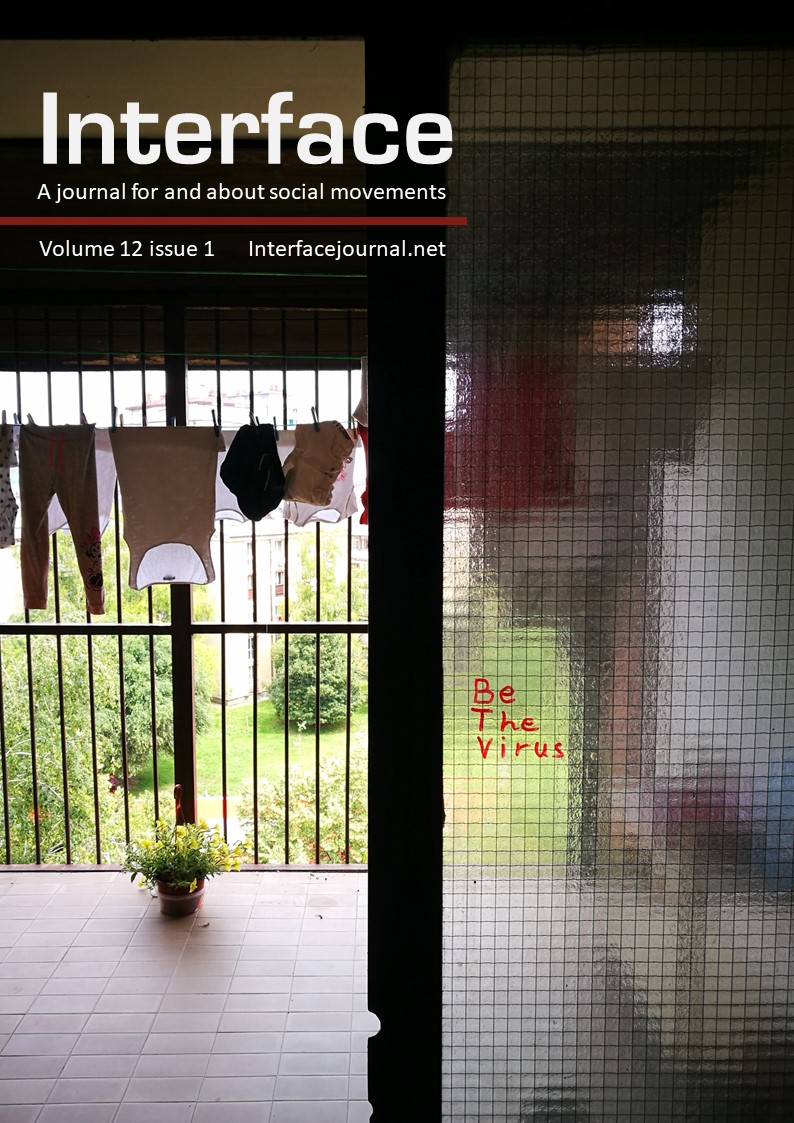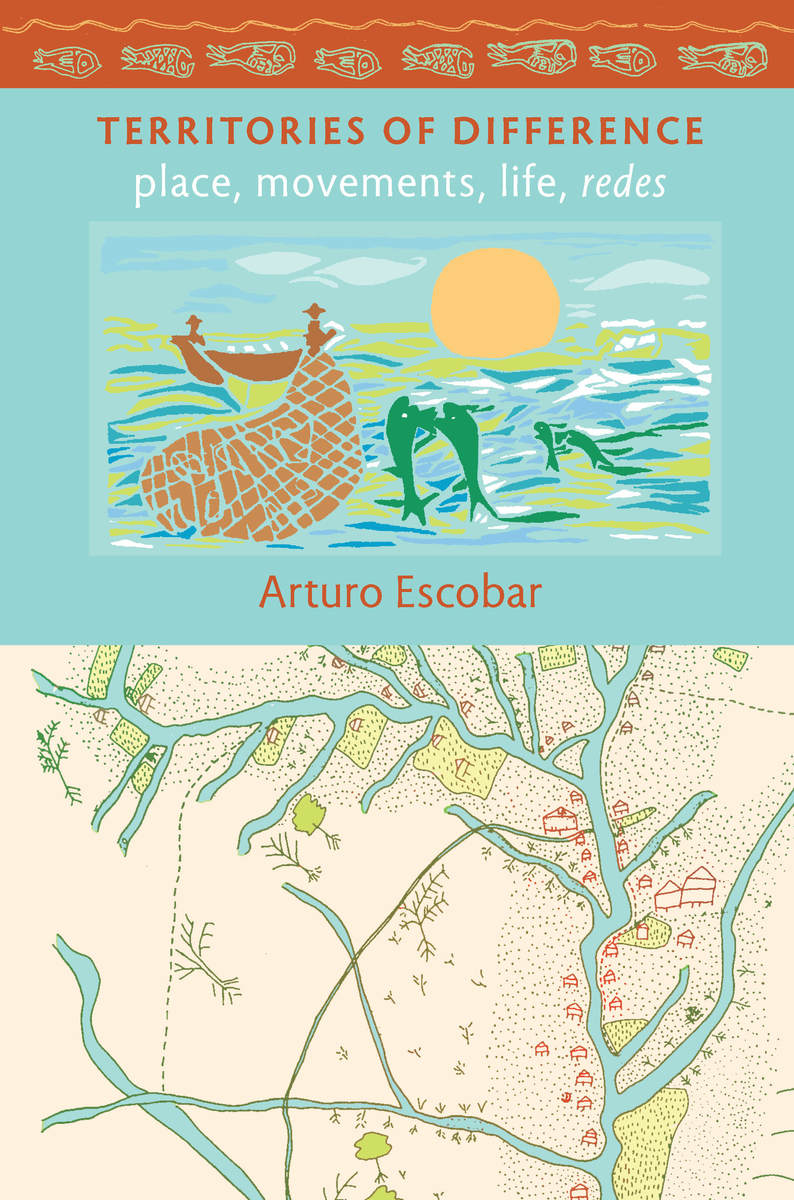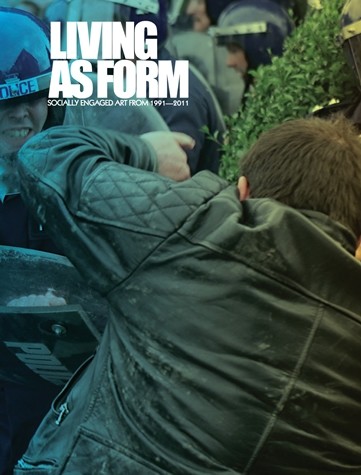Interface, 12(1): Organizing amidst COVID-19: Sharing Stories of Struggle (2020)
Filed under journal | Tags: · activism, art, contagion, ecology, feminism, food, internationalism, labour, lgbtq, migration, pandemic, quarantine, refugees, resistance, social movements, solidarity, virus

“The world is on fire, with both fever and flame. After a few months of lockdown, things are erupting in new ways. The movement for Black Lives is demanding an end to anti-Black racism and conversations about abolishing the police are on late night television. In North America, a new world appears to be dawning, one that didn’t seem possible even a month ago. Meanwhile, in the new centre of global capitalism, the long-standing Hong Kong movement seems to be on the point of succumbing to a new wave of repression.
Around the world, movements are strategizing about how to ensure that no one is left behind. In April we put out a call for short pieces on this theme. We could see that the imminent arrival of the virus had generated many different struggles – initially pressure to force some states to take action in the first place, resistance to cuts and demanding benefits. Then came struggles characterized by mutual aid, efforts to protect essential workers, and the most vulnerable, such as the homeless, prisoners, the elderly and the undocumented.
This issue contains pieces originally written for our rolling coverage of movements in the virus, as well as a few pieces written especially for this special issue. They represent reflective activists and engaged researchers trying to grasp what their movements were doing, and what they should do, in an unprecedented situation.
The contributions reflect on movements in Argentina, Australia, Austria, Belize, Bosnia and Herzegovina, Brazil, Canada, China, Denmark, Egypt, France, Germany, Greece, Haiti, India, Iran, Ireland, Italy, Japan, Kenya, Mexico, Morocco, Pakistan, Russia, Serbia, Singapore, Spain, Switzerland, Syria, Turkey, the UK, the US and globally and are written in English, French, Portuguese and Spanish.” (from Editorial)
Edited by Sutapa Chattopadhyay, Lesley Wood, and Laurence Cox
Publisher Interface, July 2020
ISSN 2009-2431
683 pages
Arturo Escobar: Territories of Difference: Place, Movements, Life, Redes (2008)
Filed under book | Tags: · anthropology, assemblage, biodiversity, black people, complexity theory, decoloniality, epistemology, ethnography, governance, indigenous peoples, modernity, nature, politics, self-organization, social movements, state, territory

“In Territories of Difference, Arturo Escobar, author of the widely debated book Encountering Development, analyzes the politics of difference enacted by specific place-based ethnic and environmental movements in the context of neoliberal globalization. His analysis is based on his many years of engagement with a group of Afro-Colombian activists of Colombia’s Pacific rainforest region, the Proceso de Comunidades Negras (PCN). Escobar offers a detailed ethnographic account of PCN’s visions, strategies, and practices, and he chronicles and analyzes the movement’s struggles for autonomy, territory, justice, and cultural recognition. Yet he also does much more. Consistently emphasizing the value of local activist knowledge for both understanding and social action and drawing on multiple strands of critical scholarship, Escobar proposes new ways for scholars and activists to examine and apprehend the momentous, complex processes engulfing regions such as the Colombian Pacific today.
Escobar illuminates many interrelated dynamics, including the Colombian government’s policies of development and pluralism that created conditions for the emergence of black and indigenous social movements and those movements’ efforts to steer the region in particular directions. He examines attempts by capitalists to appropriate the rainforest and extract resources, by developers to set the region on the path of modernist progress, and by biologists and others to defend this incredibly rich biodiversity “hot-spot” from the most predatory activities of capitalists and developers. He also looks at the attempts of academics, activists, and intellectuals to understand all of these complicated processes. Territories of Difference is Escobar’s effort to think with Afro-Colombian intellectual-activists who aim to move beyond the limits of Eurocentric paradigms as they confront the ravages of neoliberal globalization and seek to defend their place-based cultures and territories.”
Publisher Duke University Press, 2008
New Ecologies for the Twenty-first Century series, 1
ISBN 9780822343271, 0822343274
xvi+435 pages
Reviews: Laura Fano Morrissey (Development, 2009), Christopher L. Chiappari (Latin American Politics & Society, 2010), Pierre Hamel (American Journal of Sociology, 2010), Lilly U. Nguyen (Interactions, 2010), Rodrigo A. Lima de Medeiros & Guilherme F. W. Radomsky (Sociedade e Estado, 2010, BR-PT), Manuel J. Prieto (Revista de geografía Norte Grande, 2010, ES), Jeffrey S. Juris (American Anthropologist, 2011), Cornelia Butler Flora (J Agric Environ Ethics, 2011), Claudia Steiner (Americas, 2011), Paul Routledge, Juanita Sundberg, Marcus Power, & Arturo Escobar (Progress in Human Geography, 2012).
PDF (5 MB)
Comment (0)Nato Thompson (ed.): Living as Form: Socially Engaged Art from 1991-2011 (2012)
Filed under book, catalogue | Tags: · activism, art, participation, performance, public art, public sphere, social movements

“Over the past twenty years, an abundance of art forms have emerged that use aesthetics to affect social dynamics. These works are often produced by collectives or come out of a community context; they emphasize participation, dialogue, and action, and appear in situations ranging from theater to activism to urban planning to visual art to health care. Engaged with the texture of living, these art works often blur the line between art and life. This book offers the first global portrait of a complex and exciting mode of cultural production—one that has virtually redefined contemporary art practice.
Living as Form grew out of a major exhibition at Creative Time in New York City. Like the exhibition, the book is a landmark survey of more than 100 projects selected by a thirty-person curatorial advisory team; each project is documented by a selection of color images. The artists include the Danish collective Superflex, who empower communities to challenge corporate interest; Turner Prize nominee Jeremy Deller, creator of socially and politically charged performance works; Women on Waves, who provide abortion services and information to women in regions where the procedure is illegal; and Santiágo Cirugeda, an architect who builds temporary structures to solve housing problems.
Living as Form contains commissioned essays from noted critics and theorists who look at this phenomenon from a global perspective and broaden the range of what constitutes this form.”
Contributing authors: Claire Bishop, Carol Becker, Teddy Cruz, Brian Holmes, Shannon Jackson, Maria Lind, Anne Pasternak, Nato Thompson.
Publisher Creative Time, New York, and MIT Press, 2012
ISBN 9780262017343, 0262017342
259 pages
Reviews: Tom Snow (review31, n.d.), Wendy Vogel (Brooklyn Rail, 2012), Jennie Klein (PAJ, 2015), Kim Yasuda (Public Art Dialogue, 2013), Régine Debatty (We Make Money Not Art, 2012), Mark Gardner (Urban Design Review, 2012), Michael DiRisio (Public Journal, 2014), Danielle Child (Reviews in Culture, 2012), Andreas Hudelist (Theater Forschung, 2014).
Exh. reviews: Jens Hoffmann (Frieze, 2012), Ben Davis (International Socialist Review, 2012), Rachel Daniell (emisferica, 2012).
Project website, incl. Social Practice archive (300+ projects)
Exhibition
Publisher
WorldCat
PDF (19 MB)
Internet Archive (added on 2023-7-7)

